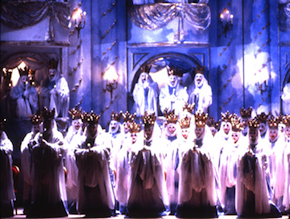
Blame Jeff Dunn for latching onto this sentence in Scott Cantrell's review of the Dallas Symphony's performance of Britten's War Requiem last year, conducted by Jaap van Zweden:
"No five minutes' worth of Western music is more emotionally moving or more beautiful."
With all due (and sincere) regard for Britten, the absolutist nature of the statement provoked my response and that of a small circle, and now the subject is to be thrown open to the distinguished readers of the column.
My own immediate reaction was, from the top of my head, five minutes' (or more) worth of:
- Götterdämmerung
- "Mondscheinmusik" from Strauss' Capriccio
- Opening the fifth door, Bluebeard's Castle
- Magic Fire, Die Walküre
- Recognition Scene from Strauss' Elektra
- "So tanzen die Angel" from Schoenberg's Gurre-Lieder
- Lots and lots of Boito's Mefistofele (opening the San Francisco Opera's fall season), such as "Giunto sul passo estremo" and the powerful Finale
And, of course, a zillion others.
Lisa Hirsch brought up an important point about the choice of the Bartók: "The fifth door is the giant, loud C major. I don't exactly think of it as emotionally moving/beautiful, more one of the greatest pure thrills. What Cantrell is saying is that nothing is more beautiful or emotionally moving than the Britten. The phrasing implies that the section has equals."

Guess I tend to equate thrilling and moving, but the subject really bears discussion. Lisa's top-of-the-head picks:
- Schubert quintet
- Beethoven's Fifth Symphony, slow movement
- Brahms's Fourth Symphony, slow movement
Jeff pitched in by agreeing with the choice of Götterdämmerung (we both meant the Redemption Theme in the Finale), adding a few, ahem, interesting picks:
- Rouse, Gorgon
- Barber, "Sure on this Shining Night"
- Elgar, The Apostles conclusion
- Strauss, Elektra conclusion
- Vaughan Williams, 1st Symphony, especially passages leading up to and including "O God Transcendent"
- Berg, conclusion to Wozzeck
- Puccini, snow love scene in Fanciulla del West, Madama Butterfly trio
(There was quick agreement in the circle about the virtues of Act 3 of La bohème, not the most popular part of the opera, but emotionally-musically perhaps the most moving.)
Michelle Dulak Thomson took up the Puccini "five-minute" thread:
The bit in Butterfly. Weird. I admire Puccini, love a great deal of it (La Bohème, Tosca, Butterfly), though ... what the heck is it? The usual "set it in six flats, because it's special" Puccini move? (Had to look it up: five sharps.) The magnanimity? I just don't know why that one hits me in the gut.
And she went on to consider some (self-described) "hopelessly hackneyed" choices:
Mahler's "Ich bin der Welt abhanden gekommen." Berlioz' "Absence" (from Les Nuits d'ete). The last variation of the slow movement of the Brahms Second String Sextet. Handel's "As with rosy steps" from Theodora. The second variation of the Heiliger Dankgesang from Beethoven's Op. 132. Um, too many things from the St. Matthew Passion to count. And even in Britten, I'd put "When most I wink, then do mine eyes best see" from the Nocturne above "Let us sleep now."One of these has haunted me from the first time I heard it, to the point where I can easily sing it myself from memory (and have, for once, memorized a Shakespeare sonnet). The other is a very lovely stretch of music that I would be happy to hear again, but don't feel compelled to.

From his Brno perch, in the town of Janáček and Korngold, though he mentions neither (is Marietta's Lied chopped chicken liver?!), Charlie Cockey pondered the matter:
There are so many pieces and passages mentioned that I would second and include, among them almost any well sung La bohème, numerous places and artists; the Bartok fifth door (definitely an overwhelming moment); the Mahler "Ich bin der Welt abhanden bekommen" among them (the first time I heard the RückerliederLord only knows how many decades ago, Flicka sang it. The closing number and the breathless extended hush that preceded the applause was so perfect I have often since wondered if perhaps she changed the sequence to end with this song).I find it hard to divorce "thrilling" from "emotionally moving", and have to add a couple of my own:
More than five minutes I'm sure, but who was counting: the ecstatic end of Messaien's Saint Francis d'Assisi in the Berkeley Symphony's concert performance one special night — all the idiophones doing two-handed double-malleted criss-crossing glissandi, every instrument in the orchestra working away like mad and suddenly you realise the chorus has been singing I couldn't breathe and afterward couldn't get up from my seat for a good 10-15 minutes — and was not alone: Pockets of stunned audience were frozen in place around Zellerbach, and kudos to the staff who bothered us never to please leave or anything.
Handel's aria "As with rosy steps the morn" from Theodora, at least when sung by Lorraine Hunt Lieberson. Can't remember how often I've listened to this, and every single time I am rendered helpless.
(If that quote I inserted in the Messiaen mention sounds familiar, it's from My First 2000 Years by George Sylvester Viereck, Paul Eldridge, though they had something else in mind than musical ecstasy.)

